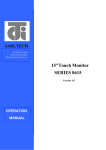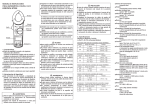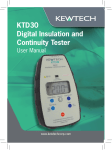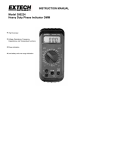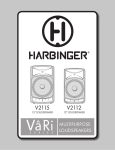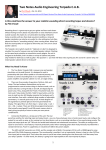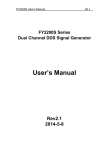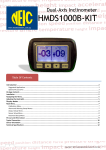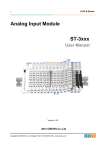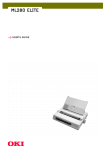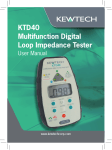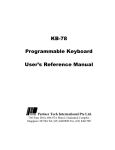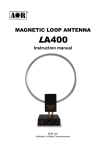Download 3 Measuring reference values for ongoing accuracy
Transcript
Contents 1 Functions and accuracy.......................................................................................... 2 2 What’s in the box? . ................................................................................................ 3 3 Measuring reference values for ongoing accuracy records ....................................... 3 4 Checking Continuity performance ........................................................................... 4 4.1 The need to null test leads . ....................................................................... 4 4.2 Instruments with a lead null function ........................................................... 4 4.2.1 Lead nulling .............................................................................. 4 4.2.2 Continuity check . ...................................................................... 4 4.3 Instruments without a lead null function . ..................................................... 5 4.3.1 Measuring lead resistance ......................................................... 5 4.3.2 Continuity check . ...................................................................... 5 4.4 Tolerance examples .................................................................................. 5 5 Insulation Resistance checks . ................................................................................ 6 6 Earth Fault Loop Impedance checks ....................................................................... 7 7 Residual Current Device checks . ............................................................................ 9 1 Functions & accuracy The Kewtech FC2000 provides a quick and simple method of checking the accuracy of electrical installation test instruments. It does not replace the calibration requirements but provides a ready check on instrument accuracy helping to minimise incorrect certification and costly revisits to confirm installation compliance. The FC2000 provides accuracy checks for test instruments used to measure: • Continuity • Insulation Resistance • Earth fault loop impedance • Operation of Residual Current Devices. Accuracy Insulation Test Continuity Test Loop Test RCD 0.5MΩ 1% 2.0MΩ 1% 200MΩ 0.5Ω 1.0Ω 2.0Ω additional 1Ω or 100Ω switched in to the Earth Loop x1 2% 1% ± 20mΩ Current Rating 1% ± 20mΩ Current Rating (pulsed) Current 1% of range Timer ± 1ms x5 Voltage Rating to 1000V. Check Value Acceptable range Rating 30mA x 1 (30mA) 30 to 33mA 30mA AC type 30mA x 5 (150mA) 30mA x 1/2 (15mA) 143 to 165mA 30mA AC type 13.5 to 15mA 30mA AC type 2 What’s in the box? 1 × FC2000 1 × Power Lead 2 × Test leads for Continuity and Insulation Resistance checks Calibration Certificate The FC2000 is supplied with a Calibration Certificate. The measured values given on the Check Label fitted in the lid and shown on the Calibration certificate are the actual resistance values for each individual FC2000. These values may vary from the Nominal Value due to the manufacturer’s tolerances for the resistors used. 3 Measuring reference values for ongoing accuracy records The FC2000 is supplied with a Calibration Certificate. The measured values given on the Check Label fitted in the lid are the ‘actual’ resistance values for each individual FC2000. These values may vary from the Nominal Value due to the manufacturer’s tolerances for the resistors used. When using the FC2000 for the first time each test instrument to be checked should be in current calibration. When the first set of tests for any instrument are undertaken: • A separate test record sheet should be kept for each test instrument. • Each test should be repeated 3 times to establish the initial test value for each particular instrument. • The value obtained over the three tests should be similar and within the instrument manufacturer’s tolerances. • The average value over the three tests should be recorded on the instrument test record as the Reference Value. • It is this Reference Value which will be used for future accuracy checks on the instrument. 4 Checking Continuity performance 4.3 Instruments without lead null function 4.1 The need to null test leads 4.3. It is essential to either null the leads or deduct the lead resistance from the measured value so that the check on the accuracy of the instrument is not affected by the test leads used. This is because the resistance of the leads may vary with use or the leads may be replaced during the lifetime of the instrument. The FC2000 includes a ‘lead null’ position for the continuity test range. This can be used either to null the leads if the test instrument being checked includes a lead-null function or to measure the lead resistance for instruments without this function. Follow section 4.2 or 4.3 as appropriate for your instrument. 4.2 Instruments with a lead null function 4.2.1 Lead nulling • • • • The leads should be connected to the instrument in the normal way. One lead should be connected to the null terminal in the continuity range. The other lead is then connected to the null terminal in the insulation resistance range. This provides a direct link between the two leads and allows them to be nulled. Null the leads according to the instrument manufacturer’s instructions. Once the leads have been nulled and providing the instrument is not switched off, there will be no need to subtract the test lead values from the measured values as the instrument should automatically deduct the resistance value of the test leads from any further measurements. If the instrument is switched off the null process will need to be repeated. 4.2.2 Continuity check • The null terminal in the continuity range is also the common terminal used for the continuity measurement. One instrument test lead should be connected to this common terminal. • The other instrument test lead should firstly be connected to the 0.5Ω terminal. • The instrument to be checked should be set to the most appropriate scale and the continuity test carried out in the normal way. • The value obtained should be recorded on the test instrument record sheet. • The same procedure should be followed using the 1Ω and 2Ω terminals. • The recorded values are compared with the reference values to assess the performance of the instrument over time. • If the measured values are found to be within the manufacturer’s tolerance then the instrument is suitable for continued use. • If any of the measured values are outside the manufacturer’s tolerance then the instrument will need to be returned for calibration. 1 Measuring lead resistance Where there is no lead null option on the instrument to be checked the null terminals can be used to establish the resistance of the test leads. • With the leads connected to the instrument in the normal way one lead should be connected to the null terminal in the continuity range and the other lead connected to the null terminal in the insulation resistance range. • The instrument should then be set to the lowest resistance scale and operated in the normal way. • The value measured by the instrument will be the resistance of the test leads. Make a note of this value as it must be subtracted from the check values obtained when checking at the three test values. 4.3.2 Continuity check • The null terminal in the continuity range is also the common terminal used for the continuity measurement. One instrument test lead should be connected to this common terminal. • The other instrument test lead should firstly be connected to the 0.5Ω terminal. • The instrument to be checked should be set to the most appropriate scale and the continuity test carried out in the normal way. • Subtract the resistance value of the leads that you previously measured from the instrument reading. The value obtained should be recorded on the test instrument record sheet. • The same procedure should be followed using the 1Ω and 2Ω terminals. • The recorded values are compared with the reference values to assess the performance of the instrument over time. • If the measured values are found to be within the manufacturer’s tolerance then the instrument is suitable for continued use. • If any of the measured values are outside the manufacturer’s tolerance then the instrument will need to be returned for calibration. 4.4 Tolerance examples If the instrument tolerance is 2% then the measured value should be within ± 2% of the reference value. So if the reference value is 0.5Ω the measured value should be between 0.51Ω and 0.49Ω. If the instrument tolerance is 2% ± 20mΩ then the measured value should be within ± 2% and ± 20mΩ of the reference value. So if the reference value is 0.5Ω the measured value should be between 0.53Ω and 0.47Ω. 5 Insulation Resistance Checks 6 Earth Fault Loop Impedance Checks There is no requirement to null the test leads for insulation resistance test checks. The FC2000 can be used to check insulation resistance testers across the voltage range. This enables the test instrument to be checked on the 250V, 500V and 1000V settings. The FC2000 provides a facility to check the accuracy of earth fault loop impedance testers. • The null terminal for the insulation resistance values is also the common terminal used for the insulation resistance checks. • One test lead for the instrument to be tested is connected to this common terminal. • The other instrument lead is connected to the 0.5MΩ terminal. • The appropriate resistance scale and test voltage are selected on the instrument being checked. • The insulation resistance tester is then operated in the normal way. • The measured value obtained is recorded on the test instrument record sheet. • The same procedure is followed for the 2MΩ and 200MΩ values. • These same tests may then be repeated for each test voltage if required. The measured values obtained are compared with the Reference Values to assess the performance of the instrument over time. • If the measured values are found to be within the manufacturer’s tolerance then the instrument is suitable for continued use. • If any of the measured values are outside the manufacturer’s tolerance then the instrument will need to be returned for calibration. Refer to section 4.4 for examples of how to apply tolerances. The socket outlet and the loop impedance switch in the FC2000 provide tests of: • the FC2000 ‘local’ earth fault loop impedance • the FC2000 ‘local’ earth fault loop with an additional 1Ω included. • the FC2000 ‘local’ earth fault loop with an additional 100Ω included. The FC2000 does introduce some additional resistance into the earth fault loop. As a result the ‘local loop’ value from the FC2000 socket outlet will be slightly higher than the loop value measured directly from the actual supply socket. Remember: RCD protected circuits should not be used to supply the FC2000 where the instrument to be checked does not have a ‘no-trip’ test option. As the FC2000 will be used to check the accuracy of the instrument it is strongly advised that both plugs (13A and IEC) used to connect the FC2000 to the supply and the 13A instrument plug into the FC2000 socket are each inserted and removed several times before undertaking the accuracy check. This process will help to reduce any additional resistance which may be caused by tarnishing of the pins or socket tubes. Note: Where the instrument being checked does not have an inbuilt on/off switch it is recommended that the FC2000 is connected to a switched socket. The instrument must be switched off when changing the earth fault loop settings on the FC2000. Site Check The FC2000 provides a fast check option for the earth fault loop impedance tester. This enables the instrument to be checked on site to confirm the accuracy of the instrument measurement. This site check consists of a measurement of the FC2000 local loop and then the same measurement with 1Ω resistance added. And then again with100 Ω resistance added. This will identify whether the instrument is accurately measuring the 1Ω and 100 Ω increase. This check may be carried out at any suitable socket outlet. • The FC2000 should be plugged into a suitable power socket and set to the ‘local loop’ setting. • The earth fault loop impedance tester is then plugged into the FC2000 socket outlet and the test carried out in the usual way. The measured value is recorded. • Either the test instrument or the supply socket is then switched off for a period of 5 seconds. • The FC2000 loop impedance switch is moved to the +1Ω position. • The instrument or supply socket is then switched on. The earth fault loop impedance test is then carried out in the usual way. The measured value is recorded on the instrument record sheet. Comparing the ‘local loop’ value and the ‘+1.0Ω’ value should show the increase of 1Ω, within the manufacturer’s tolerance. • The FC2000 loop impedance switch is moved to the +1Ω position. • The instrument or supply socket is then switched on. • Either the test instrument or the supply socket is then switched off for a period of 5 seconds. • The earth fault loop impedance test is then carried out in the usual way. The measured value is recorded on the instrument record sheet. • After 5 seconds the FC2000 loop impedance switch is moved to the +100Ω position. • Either the test instrument or the supply socket is then switched off for a period of 5 seconds. • The instrument or supply socket is then switched on. • The earth fault loop impedance test is then carried out in the usual way. The measured value is recorded on the instrument record sheet. • After 5 seconds the FC2000 loop impedance switch is moved to the +100Ω position. • The instrument or supply socket is then switched on. Comparing the ‘local loop’ value and the ‘+100Ω’ value should show the increase of 100Ω, within the manufacturer’s tolerance. • The earth fault loop impedance test is then carried out in the usual way. The measured value is recorded on the instrument record sheet. Refer to section 4.4 for examples of how to apply tolerances. • The measured values obtained for each of the four tests are then compared with the reference values on the Record Sheet. The results should be within the manufacturer’s tolerance of the Reference Value. Ongoing accuracy record To give a more exact indication of the instrument accuracy it is strongly recommended that the same dedicated power outlet is used each time for the checks. This will allow the instrument to be compared with the: • actual local loop value • FC2000 ‘local loop’ value at that socket • FC2000 ‘local loop + 1Ω’ value and • FC2000 ‘local loop + 100Ω’ value. This process will give a reference against three Reference Values and provide a more precise indication of the instrument accuracy. The earth fault loop impedance tester is used to 1 Test and record the actual loop impedance from the dedicated socket outlet. 2 Test and record the FC2000 ‘local loop’ value. 3 Test and record the ‘local loop + 1Ω value. 4 Test and record the ‘local loop + 100Ω value. Each of the above tests is repeated three times and the average value recorded as the Reference Value for each test. The Reference values obtained for tests 1, 2, 3 and 4 above (socket loop, local loop, local loop +1Ω and local loop + 100Ω) then provide four reference points with which to compare the instrument accuracy. • The earth fault loop impedance tester is used to test the earth fault loop impedance at the dedicated socket and the value recorded on the instrument record sheet. • The earth fault loop impedance tester is then plugged into the FC2000 socket outlet and the test carried out in the usual way. The measured value is recorded. • Either the test instrument or the supply socket is then switched off for a period of 5 seconds. If the results show the instrument is accurately measuring the values, within the instrument manufacturer’s tolerance then the instrument is suitable for continued use. If any of the measured values are outside the manufacturer’s tolerance then the instrument will need to be returned for calibration. Refer to section 4.4 for examples of how to apply tolerances. 7 Residual Current Device Checks The FC2000 provides a facility to check the accuracy of residual current device test instruments relative to the testing of 30mA RCDs, the most common type used for additional protection. Note: Using the RCD test function will introduce a small fault current to the circuit being used to power the check box for a period of 38ms in the same way that using an RCD tester on the same circuit without the check box in-line would. It is therefore recommended that this function is used on non-RCD protected circuits. When the RCD/LOOP switch of the FC2000 is set to the RCD position the tests of: • ½ × IΔn test at 15mA • 1 × IΔn test at 30mA • 5 × IΔn test at 150mA can be carried out at the FC2000 socket outlet. The FC2000 checks both the accuracy of the displayed disconnection time and the accuracy of the tester’s output current. Note: The FC2000 function for the 1 × IΔn and the 5 × IΔn test has a set operation time of 38ms ±1ms so the instrument being checked should display a value, subject to the instrument manufacturers’ tolerance, of 37–39ms. Site Check The connection to the FC2000 is made using the instrument test lead which is fitted with a BS 1363 (13A) plug into the test socket. The selection switch is set to the RCD position and the test instrument plugged into the FC2000. 1 × IΔn (30mA) • The instrument is set to the 30mA and the 1 × IΔn (30mA) setting at 0º. • The test is then carried out at the instrument. The reading obtained on the test instrument should be between 37ms and 39ms subject to the manufacturer’s tolerances. The illumination of the 30mA LED on the FC2000 indicates that the test has been carried out and the instrument output current is acceptable. If the output current from the tester is outside the acceptable range then the tester may still operate the RCD trip but the 30mA LED will not light. If this happens the test result obtained (the displayed disconnection time) is not valid as the tester has failed to supply the indicated test current. The FC2000 automatically resets ready to test after a period of around 4 seconds when the LED goes out. • The instrument is then set to the 30mA and the 1 × IΔn (30mA) setting at 180º and the above test repeated. 5 × IΔn (150mA) • The instrument under test is then set to the 5 × IΔn 150mA setting at 0º. • The test is then carried out at the instrument. The reading obtained on the test instrument should be between 37ms and 39ms subject to the manufacturer’s tolerances. The illumination of the 150mA LED on the FC2000 indicates that the test has been carried out and the instrument output current is acceptable. If the output current from the tester is outside the acceptable range then the tester may still operate the RCD trip but the 150mA LED will not light. If this happens the test result obtained (the displayed disconnection time) is not valid as the tester has failed to supply the indicated test current. The FC2000 automatically resets ready to test after a period of around 4 seconds when the LED goes out. • The instrument is then set to the 5 × IΔn 150mA setting at 180º and the above test repeated ½ × IΔn (15mA) • The instrument under test is then set to the ½ × IΔn 15mA setting at 0º. • The test carried out at the instrument. • The illumination of the 15mA LED on the FC2000 indicates that the test has been carried out and the instrument output current is acceptable. • The FC2000 automatically resets ready to test after a period of around 4 seconds when the LED goes out. • The reading obtained on the test instrument should indicate that the trip did not occur in the 2 second time period. (The reading shown will depend upon the test instrument being used as this varies according to the manufacturer.) If the output current from the tester is outside the acceptable range then the tester may still indicate that the trip did not occur in the 2 second time period but the 15mA LED will not light. If this happens the test result obtained is not valid as the tester has failed to supply the indicated test current. If satisfactory press the phase selection switch to change the test phase angle to 180º and repeat above tests. Ongoing accuracy record The procedure given above for the site check may also be used to provide a record of ongoing accuracy for the RCD test instrument. This is possible because the test of the RCD instrument is carried out within the FC2000 unit and is independent of any external influence. The test should be carried out at regular intervals and the results recorded on the ongoing accuracy record sheet for the instrument. Refer to section 4.4 for examples of how to apply tolerances. FC2000 CHECK BOX User Manual Kewtech Corporation Limited Midas House, Unit 2b, Stones Courtyard, High Street, Chesham, Bucks HP5 1DE T: 01494 792 212 F: 01494 791 826 E: [email protected] www.kewtechcorp.com Issue 1 www.kewtechcorp.com







